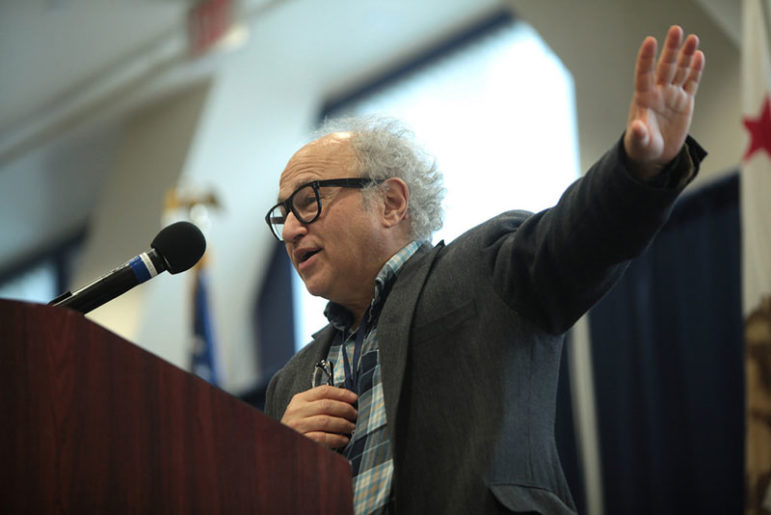
December 17, 2016; Haaretz
The diplomatic community has taken President-elect Donald Trump’s choice of David M. Friedman to serve as the United States’ next ambassador to Israel as a signal of an important shift in America’s stance toward this fractured region. At the same time, Friedman’s potential appointment could upset a balance among the American Jewish Community and may impact a number of important nonprofit organizations.
Mr. Friedman is a bankruptcy attorney by profession and a longtime business associate of Mr. Trump and his son-in-law, Jared Kushner. He will come to this position, if approved, with strong opinions on the Middle East but no previous diplomatic experience.
If his stated positions, which strongly support the right of Israel to settle and annex lands captured in 1967, are those put forward by President-elect Trump when he is sworn in, they represent a sharp break with the direction of previous presidents, Democratic and Republican both, who refused to move the U.S. Embassy to Jerusalem and saw the growth of Israeli settlements as a deadly threat to a “two-state” solution.
Palestinian and Israeli leaders met the appointment with very different responses, with clear indications that it would unsettle an already tense situation. Palestinian chief negotiator Saeb Erekat told reporters, “Who Donald Trump appoints…is his business. What is not Trump’s business is to determine capitals of other nations. I look David Friedman and Trump in the eye and tell them—if you were to take these steps of moving the embassy and annexing settlements in the West Bank, you are sending this region down the path of something that I call chaos, lawlessness and extremism. These moves would destroy the peace process.”
In Israel, Deputy Foreign Minister Tzipi Hotovely used her Facebook page to welcome the appointment, describing it as “good news for Israel. His positions encapsulate the desire to strengthen the status of Israel’s capital, Jerusalem, and the understanding that settlements have never been the real problem in the region.”
Sign up for our free newsletters
Subscribe to NPQ's newsletters to have our top stories delivered directly to your inbox.
By signing up, you agree to our privacy policy and terms of use, and to receive messages from NPQ and our partners.
In the United States, the announcement of Mr. Friedman’s nomination has set off a battle in the heart of the American Jewish community that has the potential to result in a major schism. Beyond his views on captured territories, settlements, and the two-state solution, Mr. Friedman has been a very harsh critic of those who disagree with him and his positions. He has described President Obama and Secretary Kerry’s actions as evidence of their “blatant anti-Semitism,” and he has characterized a leading American Jewish Organization as similar to Jews who cooperated with the Nazi Government.
Finally, are J Street supporters really as bad as kapos? The answer, actually, is no. They are far worse than kapos—Jews who turned in their fellow Jews in the Nazi death camps. The kapos faced extraordinary cruelty, and who knows what any of us would have done under those circumstances to save a loved one? But J Street? They are just smug advocates of Israel’s destruction delivered from the comfort of their secure American sofas—it’s hard to imagine anyone worse.
Organizations that agree with his policy positions, like the Zionist Organization of America, have been very positive about his new role. ZOA President Morton Klein said Friedman has “the potential to be the greatest U.S. ambassador to Israel ever.” Matt Brooks, executive director of the lobbying group Republican Jewish Coalition, tweeted, “Great choice! David is someone who understands the President’s vision and will strengthen the US-Israel relationship.”
Four American Jewish groups—Americans for Peace Now, J Street, the New Israel Fund, and Ameinu—are so strongly opposed to Mr. Friedman that they have launched a campaign encouraging the Senate to withhold their consent and reject the appointment. NIF CEO Daniel Sokatch placed the appointment in a wider context when he told the Israeli newspaper Haaretz
This is the kind of fight going to the mat for, win or lose. We feel we have to exercise the tools of liberal democracy to protect liberal democracy. This is a test for us, working on this side of the ocean, but these are extraordinary times. What we’re seeing in Israel, Brexit, with Trump, is a tide of neo-authoritarianism sweeping the globe. We have to push back against this. Our donors understand that, just as what’s happened in Israel and the Tea Party and Trump are all connected by themes of xenophobia and nationalism, so are we connected.
The depth and emotion of this disagreement has the potential to cause lasting harm to the organized Jewish community. If this heated debate splits local communities along these lines, the large Jewish Federation movement, which supports a wide range of social welfare programs in their local communities, may find this tussle harming their ability to raise funds and, ultimately, the organizations they fund. If the new administration takes a dim view of opposition from the Jewish community, organizations that seek and receive federal grants for their work may find this controversy makes it harder to succeed. With passions so high, it is difficult to see how the waters will be calmed after January 20th.—Martin Levine













